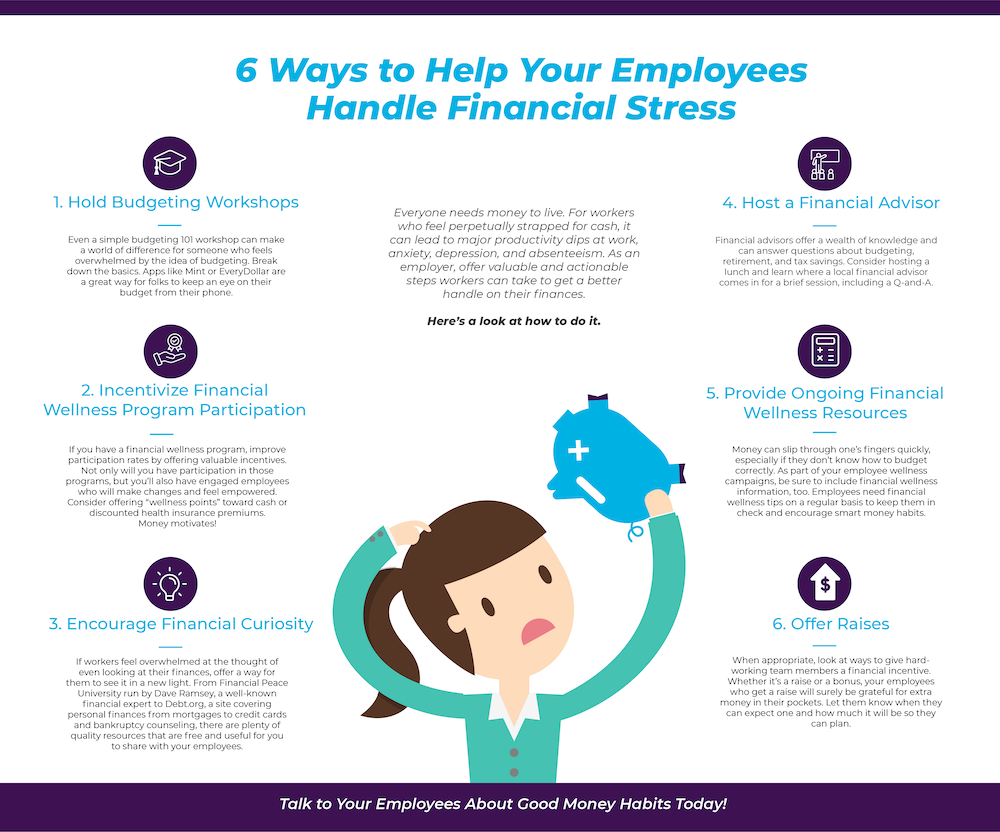 For many workers, it doesn’t take much for financial stress to become a major burden. At any point in a career, financial stress can impact an employee — whether it’s a major illness, a missed mortgage payment, a car problem, or some other life event.
For many workers, it doesn’t take much for financial stress to become a major burden. At any point in a career, financial stress can impact an employee — whether it’s a major illness, a missed mortgage payment, a car problem, or some other life event.
When money woes pile up, it can cause financial stress, and mental health often suffers.
According to The Hartford, a provider of employee benefits and absence management, workers are feeling overwhelmed by their financial situation: 63% of U.S. workers feel their financial stress has increased over the past year. And 56% report it negatively impacts their mental health.
In this blog, you’ll learn about the impacts of financial stress on the workplace and how employers can help employees get on the right track when it comes to money.
Employers Should Worry About Workers’ Financial Stress
Recent research shows that financial stress has become the number one source of stress for most employees even above health issues, family life, and work, according to Morgan Stanley.
Everything costs more these days — gas, food, clothing, shelter — that it’s no wonder two out of five employees feel an increase in the cost of living is the most stressful part of finances.
While you may think that your employees’ financial issues aren’t yours, turning away from money discussions can do more harm than good — for your employees and your business.
Negative ways financial stress impacts workplaces and workers:
- Retention - Employees who need more funds are more likely to seek employment elsewhere. Or, they may get a second job which could impact their ability to perform in your workplace.
- Delays retirements - Every time the cost of living goes up, it makes it increasingly harder for employees near retirement age to retire. A recent report found that 81% of the public sector is worried about not having enough retirement money.
- Reduces productivity - A worker worried about their electricity being shut off tomorrow isn’t going to be as productive. On average, a full-time employee can spend upward of 156 hours distracted from work by personal issues.
- Weakens mental health - 49% said that money worries had a severe or major impact on their mental health in the past year, according to the 2022 PwC Employee Financial Wellness Survey.
As an employer, you have the power to help your employees reframe their thinking and give them raises. You also can give them tools and resources to become financially successful and independent.
Related: 5 Telltale Signs You Need to Take a Mental Health Day From Work
Money Woes Workers Have These Days
When you have enough money, it’s not something you think about. But it’s like oxygen — the minute you don’t have enough, it’s easy to panic. Add in the stigma of being in debt or simply dealing with a financial struggle and many people keep their financial concerns hidden away from those who can help them the most.
Some of the reasons workers are worried about money:
- They don’t have enough savings - Many are just one bad event away from being completely broke. The Hartford’s latest Future of Benefits Pulse Survey found that 39% of respondents reported they have less than $1,000 in savings or no savings at all.
- Many are preparing for recession - With regular news of layoffs, many workers are stressed about the possibility of a recession. Up to 81% of those surveyed reported taking steps like cutting back on daily expenses and looking for a higher-paying job, according to The Hartford’s survey.
The struggling economy and high cost of living are enough reasons to worry about finances. But add in other stressors like a sick relative, a medically-fragile child, or another expensive life event, and it’s no wonder workers are worried.
Below are some tips to help them stress less about money.
How to Help Ease Workers’ Financial Stress
If there is one thing that can lead to more stress, it’s being uncertain how to move forward in a situation. As an employer, you can offer valuable resources and tools to guide your workers to a more stable financial situation.
Offer valuable and actionable steps that workers can take to get a better handle on their finances. Those employees who take advantage of it will feel empowered and encouraged in their next financial steps.
Encourage Financial Curiosity
If workers feel overwhelmed at the thought of even looking at their finances, offer a way for them to see it in a new light. Some sources to consider sending them:
- Financial Peace University - Run by Dave Ramsey, a well-known financial expert, this course offers insights into knocking out debt and building wealth. He breaks it down into baby steps that make getting finances under control easy.
- Debit.org - This site offers information about personal finances from mortgages to credit cards and bankruptcy counseling.
- Suze Orman - This personal financial expert offers loads of information on her site, including goal-setting steps for finance areas like saving, investing, and home ownership.
- MyMoney.gov - This website offers tools and helpful principals to better understand finances and making the most of money.
Hold Budgeting Workshops
Even a simple budgeting 101 workshop can make a world of difference for someone who feels overwhelmed by the idea of budgeting. Break down the basics. Apps like Mint or EveryDollar are a great way for folks to keep an eye on their budget from their phone.
Offer Raises
When appropriate, look at ways to give hard-working team members a financial incentive. Whether it’s a raise or a bonus, your employees who get a raise will surely be grateful for extra money in their pockets. Let them know when they can expect one and how much it will be so they can plan.
Host a Financial Advisor
Financial advisors offer a wealth of knowledge and can answer questions about budgeting, retirement, and tax savings. Consider hosting a lunch and learn where a local financial advisor comes in for a brief session, including a Q-and-A. It’s even better if they can meet with individuals who are uncertain about money management.
Provide Ongoing Financial Wellness Resources
Money can slip through one’s fingers quickly, especially if they don’t know how to budget correctly. As part of your employee wellness campaigns, be sure to include financial wellness information, too. Sometimes a refresher on budgeting can help break bad habits and learning to invest sooner rather than later can be a wake-up call to some. Employees need financial wellness tips on a regular basis to keep them in check and encourage smart money habits.
Incentivize Financial Wellness Program Participation
If you have a financial wellness program, improve participation rates by offering valuable incentives. Not only will you have participation in those programs, but you’ll also have engaged employees who will make changes and feel empowered. Consider offering “wellness points” toward cash or discounted health insurance premiums. Money motivates!
Don’t Let Your Workers Stress Alone Over Finances
Money stress can impact everything from sleep to self-esteem and productivity to work attendance.
Everyone needs money to live, so don’t let it be a taboo subject in the workplace. Too many people flounder and get flustered by their bills piling up and often don’t see a way out. Address the concerns in the workplace as part of an ongoing comprehensive financial series.
When you do so, you’ll improve your employees’ lives more than you could ever imagine. They’ll feel more in control of their lives and won’t waste precious hours at work distracted by personal money issues. Don’t let them go it alone.
Money should always be thought of as a tool, not a goal. With the above tips, you can help your employees see it that way, too.
Do you have a financial wellness program in place? We’d love to hear your ideas in the comments below! Don’t forget to check out our post Why Employee Money Illness is Making Your Company Sick.



